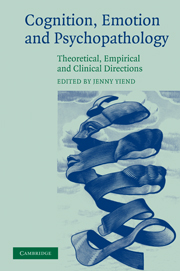Book contents
- Frontmatter
- Contents
- List of contributors
- An introduction and synthesis
- Andrew Mathews: a brief history of a clinical scientist
- Part I Theoretical approaches
- Part II Empirical directions
- 5 Habits of thought produce memory biases in anxiety and depression
- 6 Anxiety and the resolution of ambiguity
- 7 Dissociating fear and disgust: implications for the structure of emotions
- 8 The causal status of anxiety-linked attentional and interpretive bias
- 9 The experimental modification of processing biases
- Part III Clinical perspectives
- Index
8 - The causal status of anxiety-linked attentional and interpretive bias
Published online by Cambridge University Press: 23 November 2009
- Frontmatter
- Contents
- List of contributors
- An introduction and synthesis
- Andrew Mathews: a brief history of a clinical scientist
- Part I Theoretical approaches
- Part II Empirical directions
- 5 Habits of thought produce memory biases in anxiety and depression
- 6 Anxiety and the resolution of ambiguity
- 7 Dissociating fear and disgust: implications for the structure of emotions
- 8 The causal status of anxiety-linked attentional and interpretive bias
- 9 The experimental modification of processing biases
- Part III Clinical perspectives
- Index
Summary
Virtually all researchers now would agree that anxiety vulnerability is characterized by distinctive patterns of attentional and interpretive bias, and few would dispute the pivotal role that Andrew Mathews has played not only in establishing this important fact, but also in illuminating the cognitive mechanisms that underpin such effects. Mathews has been directly responsible for the lion's share of those key experimental studies that have served to define each new juncture in the evolution of our understanding about anxiety-linked processing biases. Moreover, when significant advances have been made by other researchers, then those investigators often have been ex-students and/or collaborators of Mathews, whose ideas and methodological approaches build upon foundations that Mathews himself helped to construct. Having ourselves enjoyed the privilege of an ongoing collaborative association with Andrew, we know from personal experience the tremendously constructive impact that his commitment to clarity of theoretical exposition, and to rigour in experimental design and analysis, exerts upon the work of others. Therefore, we are greatly honoured to be included in this volume, which celebrates the achievements and contributions of this distinguished and influential scholar.
Since Mathews' pioneering research in the early 1980s, the literature concerning anxiety-linked processing biases has grown exponentially (cf. MacLeod, 1999; Mathews & MacLeod, 1994). However, despite the scale and diversity of the contemporary research literature, there is one major issue concerning anxiety-linked patterns of attentional and interpretive bias that most researchers probably would agree to be of fundamental importance. Specifically, the theoretical and applied implications of the now common observation that individuals with heightened levels of anxiety vulnerability attend selectively to threatening information, and selectively impose threatening interpretations on ambiguity, depend critically upon the causal nature of this association.
Information
- Type
- Chapter
- Information
- Cognition, Emotion and PsychopathologyTheoretical, Empirical and Clinical Directions, pp. 172 - 189Publisher: Cambridge University PressPrint publication year: 2004
Accessibility standard: Unknown
Why this information is here
This section outlines the accessibility features of this content - including support for screen readers, full keyboard navigation and high-contrast display options. This may not be relevant for you.Accessibility Information
- 21
- Cited by
